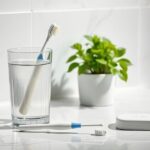Are you one of many women struggling with maintaining oral health? You might not realize that it’s not just about brushing and flossing; it involves a holistic approach that nurtures your well-being. Just like tackling fatigue and hormonal imbalance, caring for your oral health can be simple and effective. In this post, we’ll walk through practical, natural methods to boost your oral hygiene right at home.
Understanding the Link Between Oral Health and Overall Wellness
Did you know that your mouth is a reflection of your overall health? Many people underestimate the importance of maintaining good oral hygiene. Poor oral health can lead to issues beyond bad breath and cavities. It has been linked to several serious health problems, including heart disease and diabetes. The mouth can harbor bacteria that, if not managed, can enter the bloodstream and affect other parts of your body.
Studies show that inflammation in the gums can affect cardiovascular health, with bacteria from gum disease potentially contributing to arterial plaque formation. Additionally, there is evidence that people with gum disease may have higher risks for respiratory diseases, linking oral care with lung health. If you’re a woman in your 30s or older, staying aware of these connections is paramount.
Natural Remedies for Fresh Breath
No one enjoys the embarrassment of bad breath. Fortunately, there are natural remedies you can use to keep your breath fresh without relying on chemical-laden mouthwashes.
- Mint Leaves: Chewing on fresh mint leaves can naturally freshen your breath.
- Parsley: Similar to mint, parsley has antibacterial properties that can combat bad breath.
- Baking Soda: Rinsing your mouth with a solution of baking soda and water can neutralize odor-causing acids.
- Apple Cider Vinegar: A diluted rinse of apple cider vinegar can act as a natural antibacterial mouthwash.
How Diet Influences Your Oral Health
Your diet plays a crucial role in your oral health. Certain foods can either help or hinder your efforts to maintain healthy teeth and gums.
Foods high in sugar can feed harmful bacteria in your mouth, leading to tooth decay. On the other hand, consuming crunchy fruits and vegetables, such as apples and carrots, can help scrub your teeth naturally while providing essential nutrients. Calcium-rich foods, such as cheese and yogurt, are excellent for strengthening enamel.
- Fruits and Vegetables: Incorporating them into your diet can enhance your dental health.
- Whole Grains: These provide important minerals that help keep your teeth strong.
- Green Tea: This drink contains antioxidants and can help reduce inflammation, benefiting your gums.
The Benefits of Oil Pulling for Healthy Teeth
Oil pulling is an ancient practice that can contribute to better oral hygiene. It involves swishing oil (often coconut oil) in your mouth for about 20 minutes.
Many believe that oil pulling helps eliminate harmful bacteria while promoting overall oral health. Coconut oil, in particular, contains lauric acid, which has strong antibacterial properties. Regular practice can lead to whiter teeth and better gum health.
Essential Oils for Natural Oral Care
Essential oils can play a supportive role in maintaining oral health. Some popular choices include:
- Tea Tree Oil: Known for its antibacterial properties, it can reduce plaque buildup.
- Clove Oil: Acts as a natural pain reliever and can help alleviate toothaches.
- Peppermint Oil: Provides a refreshing flavor while helping to kill bacteria.
To use essential oils, you can add a drop to your toothpaste or dilute them in water for mouth rinsing.
Herbal Mouthwash Recipes You Can Make at Home
Creating your own herbal mouthwash at home is simple and effective. Here are a couple of recipes to try:
- Mint and Sage Mouthwash: Combine 1 cup of distilled water, 1 tablespoon of dried mint, and 1 tablespoon of dried sage. Let it steep for 30 minutes, strain, and use as a mouth rinse.
- Green Tea Mouthwash: Brew strong green tea, let it cool, and use it as a natural mouthwash. This will provide antioxidants that support gum health.
The Importance of Hydration for Oral Health
Staying hydrated is critical for oral health. When your body is well-hydrated, it produces adequate saliva, which is essential for neutralizing acids and washing away food particles.
Dehydration can lead to dry mouth, which increases the risk of tooth decay and gum disease. Aim to drink plenty of water throughout the day, and consider carrying a water bottle to remind yourself to sip regularly.
Tips for Maintaining Healthy Gums
Healthy gums support healthy teeth. Here are some tips to maintain gum health:
- Regular Brushing: Brush twice daily with fluoride toothpaste to prevent gingivitis.
- Flossing: Floss daily to remove plaque and food particles between teeth.
- Routine Visits: Visit your dentist regularly for check-ups and cleanings to catch any issues early.
How Stress Affects Your Oral Health
Stress is not just a mental challenge; it can also take a toll on your oral health. Many people grind their teeth or clench their jaws when stressed, leading to wear and tension in the mouth.
Stress can also exacerbate gum disease, as it weakens your immune system. To combat this, consider practicing relaxation techniques, such as yoga or meditation, to help manage stress and protect your oral health.
Simple Steps for a Daily Oral Care Routine
A consistent routine can significantly impact your oral health. Here are some essential steps you can follow:
- Brush Twice Daily: Use a soft-bristled toothbrush and fluoride toothpaste.
- Floss Daily: Flossing helps in cleaning hard-to-reach areas.
- Use Mouthwash: Opt for a natural mouthwash to avoid harsh chemicals.
- Avoid Sugary Snacks: Try to limit sugar intake to protect against cavities.
- Stay Regular with Dental Appointments: Regular visits to the dentist for check-ups and cleanings can catch potential issues before they escalate.






